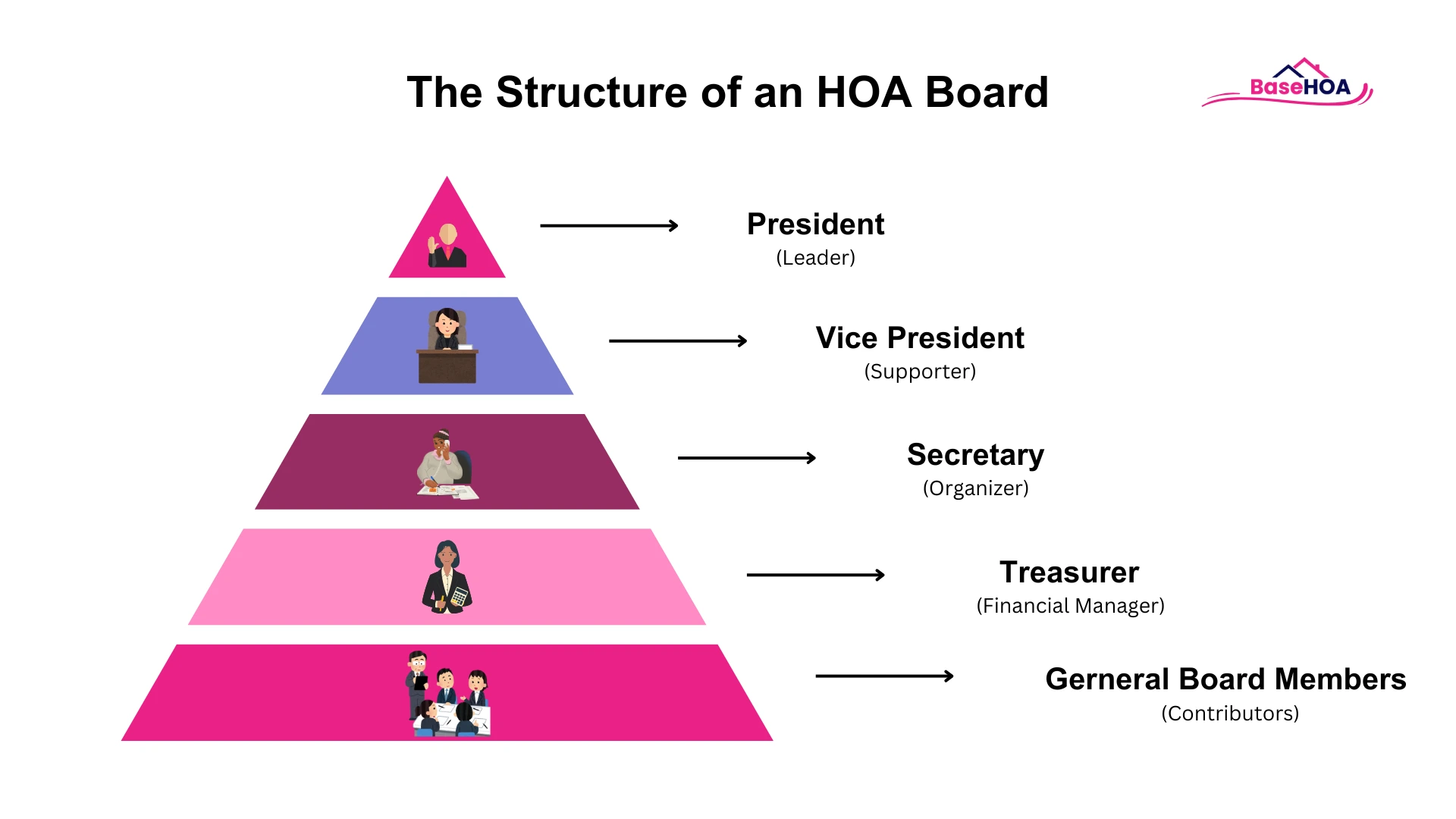If you live in a neighborhood with a homeowners association (HOA), you’ve probably heard about the HOA board of directors. But what do they actually do?
Simply put, the HOA board is responsible for keeping the community running smoothly. They manage finances, enforce rules, and make decisions that help maintain property values. But being on the board isn’t just about having authority. It also comes with legal responsibilities, tough decisions, and sometimes even disagreements with homeowners.
Whether you’re a homeowner wondering about your rights, a new board member looking for guidance, or someone dealing with HOA challenges, this guide will walk you through everything you need to know.
What Is an HOA Board of Directors?
An HOA board of directors is a group of elected homeowners responsible for managing the homeowners association (HOA) and making key decisions for the community. They enforce rules, oversee finances, and ensure the neighborhood is well-maintained.
Think of the HOA board as the leadership team that keeps everything running smoothly. Most boards include four core members: a president, vice president, secretary, and treasurer. Some communities also have general board members and committees to help with specific tasks. While board members are volunteers, they have a legal responsibility to act in the best interest of homeowners.
Why Do HOAs Need a Board?
Without an HOA board, there would be no one to:
- Enforce community rules, including Covenants, Conditions & Restrictions (CC&Rs)
- Oversee financial decisions and budgeting
- Manage maintenance, amenities, and common areas
- Resolve conflicts between homeowners
Board members aren’t paid, but they have a fiduciary duty to serve the community with transparency, fairness, and accountability. Their decisions directly impact property values and the quality of life for everyone in the neighborhood.
Key Roles & Responsibilities of an HOA Board
A well-run HOA board works like a strong team, with each member playing a specific role to keep things running smoothly. Here’s a breakdown of what each position does and responsibilities.

President
The president is the leader of the HOA board, responsible for overseeing operations and making key decisions. If the board cannot reach a unanimous decision, the president typically has the final say.
A strong president must have a deep understanding of HOA bylaws and regulations to ensure decisions align with community rules, including the management of HOA fees. They also need to be familiar with all aspects of the association, from financials to community projects, to ensure everything runs at full capacity.
Duties:
- Leads and oversees the HOA’s operations
- Runs board meetings and ensures decisions follow HOA bylaws
- Works with legal and financial professionals when necessary
Vice President
The vice president supports the president and steps in when they are unavailable. Their role is similar to the president’s, but they may also take charge of specific projects or community initiatives.
A vice president should have the same level of knowledge as the president regarding HOA bylaws, finances, and operations, as they may need to make critical decisions in the president’s absence.
Duties:
- Acts on behalf of the president when needed
- Oversees specific projects and community improvements
Secretary
The secretary is responsible for keeping the HOA’s records organized and ensuring proper communication between board members and homeowners.
From managing official documents to notifying homeowners of upcoming meetings, the secretary plays a key role in keeping the community informed and ensuring transparency.
Duties:
- Maintains all HOA documents and records
- Notifies residents and board members about meetings
- Records and distributes meeting minutes
Treasurer
The treasurer manages the HOA’s finances. They track income and expenses, prepare budgets, and make sure homeowner dues are collected and spent appropriately.
A responsible treasurer helps prevent financial issues and ensures the community has enough funds for maintenance, amenities, and future projects.
Duties:
- Manages the HOA’s financial records and budget
- Oversees dues collection and ensures proper fund allocation
- Prepares financial reports and audits
- Handles taxes and ensures financial compliance
General Board Members
General board members vote on community matters and play an essential role in enforcing rules. They serve as a liaison between residents and the board, ensuring that the concerns of homeowners are heard and addressed.
A good general board member is an active participant in meetings, offers valuable input, and supports the community’s vision. They help ensure decisions made by the board reflect the best interests of the residents.
Duties:
- Vote on community matters and help enforce rules
- Serve as a liaison between residents and the board
- Participate in community initiatives and discussions
A strong HOA board functions best when each member understands their role and works together to make informed, fair decisions that benefit the entire community.
How Are HOA Board Members Elected (or Removed)?
Elections typically happen once a year, and homeowners in the community vote on who represents them. But how does the process work?
How HOA Board Elections Work
Homeowners interested in serving on the board can nominate themselves during the nomination period. After that, homeowners cast their votes, typically during the annual meeting. Once elected, board members serve for a set term, which usually lasts between one to three years. This should cover the basics of the election process, but it might vary slightly depending on the community’s specific rules and bylaws.
Can You Remove an HOA Board Member?
Yes, it is possible to remove a board member, but there is a formal process involved. Homeowners must first submit a petition to begin the removal procedure. Then, a special meeting is scheduled where homeowners can vote on the matter. In some cases, a legal review may also be necessary. Board members can be removed for reasons like misconduct, negligence, or failing to meet their responsibilities.
Legal & Fiduciary Responsibilities of HOA Boards
HOA board members aren’t just volunteers, they have legal responsibilities that must be taken seriously.
What Is Fiduciary Duty?
A fiduciary duty means board members must act in the best interest of the HOA, not personal gain. This includes:
- Duty of care: Making informed, responsible decisions
- Duty of loyalty: Avoiding conflicts of interest
- Duty of obedience: Following the HOA’s governing rules and documents
Common Legal Issues HOA Boards Face
- Misuse of funds → Can lead to lawsuits if HOA funds are mismanaged
- Failure to enforce rules → Inconsistent enforcement can cause legal disputes
- Discrimination claims → HOAs must follow fair housing laws
According to the Illinois Department of Financial and Professional Regulation, board members must uphold their fiduciary duties with integrity and transparency. Ignoring these responsibilities can lead to personal liability for board members, so proper governance is essential.
Common HOA Board Challenges & How to Solve Them
HOA boards don’t always have it easy. Here are some of the biggest challenges they face, and how to handle them.
Disputes Between Homeowners & the Board
Homeowners sometimes feel the board is being unfair or overstepping its role. To avoid this, improving communication is key. Holding open meetings and providing regular updates can help everyone feel informed and give the board a chance to explain its decisions.
Financial Mismanagement
Budget shortfalls or misused funds can become a big concern. The best way to keep things on track is by conducting regular audits and bringing in financial experts when needed. This helps make sure the budget stays balanced, and funds are used responsibly.
Enforcing Rules Without Backlash
It can be tough to enforce rules when homeowners resist fines or restrictions. The key to handling this is consistency. By applying the rules fairly to everyone, the board can avoid accusations of favoritism and make sure everyone feels the rules are there for the community’s benefit.
How to Communicate Effectively as an HOA Board
Clear communication can prevent 90% of HOA conflicts. Here’s how to keep homeowners informed and engaged.
6 Tips for Better HOA Communication
1. Use Multiple Ways to Share Info
People prefer different ways of getting information. Use email, newsletters, and even a custom HOA website to keep everyone in the loop.
With BaseHOA, you can create a simple website for your community, where homeowners can find important updates, documents, and announcements all in one place.
2. Be Open and Transparent
When board meetings happen or big decisions are made, share the details with homeowners. Post meeting minutes and financial reports on your website. When everyone knows what’s going on, there’s less room for confusion or mistrust.
3. Encourage Feedback
Give homeowners a chance to share their thoughts and ask questions. Make sure they feel heard. After all, this is their community too, and involving them in decisions helps strengthen the bond.
4. Respond Quickly to Questions
When a homeowner reaches out, reply as soon as possible. Fast responses show that you care and helps keep concerns from escalating into bigger problems.
5. Update Regularly
Keep everyone informed by sending out regular newsletters. This way, homeowners will always know what’s coming up and what changes are being made. It keeps everyone on the same page.
6. Keep It Simple
Don’t use jargon or overly complicated language. Communicate in a way that everyone can understand, no matter their background.
When HOA boards communicate well, it makes everyone’s experience smoother and more positive. And with tools like BaseHOA, setting up a user-friendly website to keep homeowners informed is easier than ever.
Can You Sue an HOA Board of Directors?
Yes, it’s possible to sue an HOA board, but it should always be a last resort. Legal action is expensive, time-consuming, and can create long-lasting tension in the community.
There are situations where legal action may be justified, such as if there is financial fraud or mismanagement, unfair rule enforcement, or if the board fails to follow the HOA’s bylaws. However, before rushing to court, consider exploring alternatives.
Mediation can be an effective way to resolve disputes. A neutral third party can help facilitate a solution without the need for legal proceedings. Another option is to file a complaint with your state’s HOA regulatory body. Many states offer formal processes or legal guidance to resolve HOA conflicts, often before escalating to a lawsuit.
While suing is always an option, it’s usually more productive to try these alternatives first to avoid unnecessary costs and maintain a healthier community relationship.
FAQs
Do HOA board of directors get paid?
Most HOA board members do not get paid. They volunteer their time. However, some HOAs may give a small payment or cover certain costs for board members.
How much power does an HOA board have?
They can enforce rules and fees, but must follow state laws and bylaws.
What happens if an HOA board fails to act?
Homeowners may have legal grounds to remove board members or take legal action.
Final Thoughts
Running an HOA board doesn’t have to be overwhelming. When done right, it creates a community where everyone thrives. A strong board focuses on being transparent, fair, and communicative. Whether you’re a board member or a homeowner, understanding each other’s roles and staying connected is key to keeping everything running smoothly.
For board members, it’s important to stay on top of rules and responsibilities. This helps build trust with the community. Homeowners, on the other hand, can avoid frustration by staying informed and actively participating.
If you want to make your HOA board’s work easier, BaseHOA can help. With features that simplify communication, scheduling, online payment, and document management, BaseHOA makes it easier to keep your community organized and connected.
Ready to streamline your HOA management? Try BaseHOA today with a free trial and see how much easier it can be to keep your community running smoothly!


